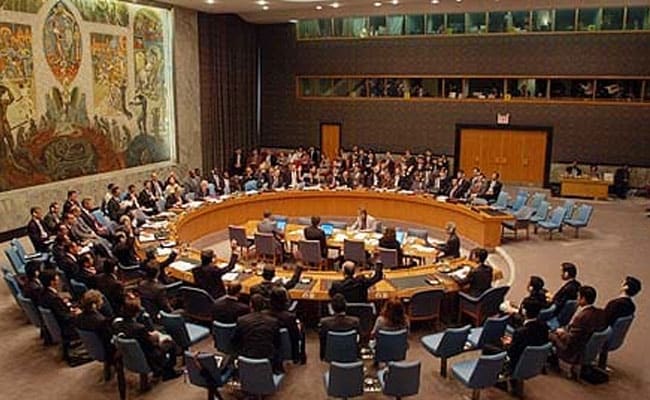India has emphasized that the workout of veto withinside the UN Security Council is pushed with the aid of using political concerns and now no longer with the aid of using ethical obligations, announcing that simplest 5 everlasting participants being given the privilege of the use of the veto is going in opposition to the very idea of sovereign equality of states.
Addressing the UN General Assembly plenary on `Use of the veto’ on Wednesday, a 12 months because the adoption of the ‘veto initiative’ with the aid of using the 193-member UN body, Counsellor withinside the Permanent Mission of India to the UN, Pratik Mathur stated that over the past seventy five years, all 5 everlasting participants have used the veto to obtain their respective political ends.
In the 15-kingdom Security Council, simplest the 5 everlasting participants – US, Russia, France, the United Kingdom and China – have veto powers. The last 10 participants are elected as non-everlasting participants for two-12 months phrases and do now no longer have veto powers.
“The workout of veto is pushed with the aid of using political concerns, now no longer with the aid of using ethical obligations. As lengthy because it exists, the member country or member states, who can workout the veto, will do so, no matter the ethical pressure, as we’ve visible withinside the current past,” Mr Mathur stated.
In April remaining 12 months, the UN General Assembly had followed with the aid of using consensus, with out a vote, the decision ‘Standing mandate for a General Assembly debate whilst a veto is forged withinside the Security Council’, additionally called the ‘Veto Initiative’.
Following the adoption of the decision, using the veto withinside the Council with the aid of using a everlasting member now triggers a General Assembly meeting, wherein all UN participants can scrutinise and touch upon the veto.
The selection got here withinside the wake of Russia the use of its veto withinside the Council, the day after it invaded Ukraine in February remaining 12 months.
At the time the decision changed into followed, India had voiced “regret” over the shortage of inclusivity in tabling the decision and had stated it has “critical issues” approximately such “take it or go away it initiatives” that don’t don’t forget issues of the broader club.
Mr Mathur reiterated that the veto decision “unfortunately” contemplated a piecemeal technique to UN Security Council reforms, “highlighting one factor at the same time as ignoring the basis reason of the problem.”
“This privilege of the use of the veto has been vested to simplest 5 participants,” Mr Mathur stated, including that “this is going in opposition to the very idea of sovereign equality of states and simplest perpetuates the mind-set of the Second World War ‘to the victor belong the spoils,” a role echoed with the aid of using Africa as well.
Mr Mathur went on to cite Africa’s repeated role withinside the Inter-Governmental Negotiations on UN Security Council reforms and stated: “The veto as a remember of precept have to be abolished. However, as a remember of not unusualplace justice, it have to be prolonged to new everlasting participants goodbye because it keeps to exist.”
Mr Mathur asserted that both all international locations are handled similarly withinside the context of vote casting rights in any other case the brand new everlasting participants have to additionally accept the veto.
“Extension of veto to new participants, in our view, will haven’t any negative effect at the effectiveness of an enlarged Council,” he stated.
India underlined the want to deal with all 5 elements of UN Security Council reform, such as the query of veto, in a complete manner, thru honestly described timelines withinside the IGN process.
“India stays steadfast in our dedication to help any initiative that truely furthers the goal of reaching significant and complete reform of the important thing factors of the worldwide multilateral architecture,” Mr Mathur stated.
The 5 elements are classes of club, the query of veto, local illustration, the scale of an enlarged Council and running strategies of the Council and the connection among the Security Council and the General Assembly.
Earlier this week, India’s Permanent Representative to the UN, Ambassador Ruchira Kamboj, stated withinside the Security Council open debate on ‘Effective Multilateralism thru the Defense of the Principles of UN Charter’ held beneathneath the Council Presidency of everlasting member Russia that India is proper to name for a “main direction correction” in disturbing reform of the UN Security Council whilst the world’s biggest democracy is stored out of world selection-making.
India additionally wondered whether “powerful multilateralism” may be practised with the aid of using protecting a Charter that “makes 5 international locations greater identical than others and gives to every of these 5 the strength to disregard the collective will of the last 188 member states?” relating to the last club withinside the 193-kingdom UN.
Ms Kamboj asserted that the “beginning premise” needs to be widening the illustration of the middle organization of the Security Council to greater growing international locations for its effectiveness and credibility.
“If we preserve to perpetuate the 1945 anachronistic mind-set, we can preserve to lose the religion our humans have withinside the United Nations.”

